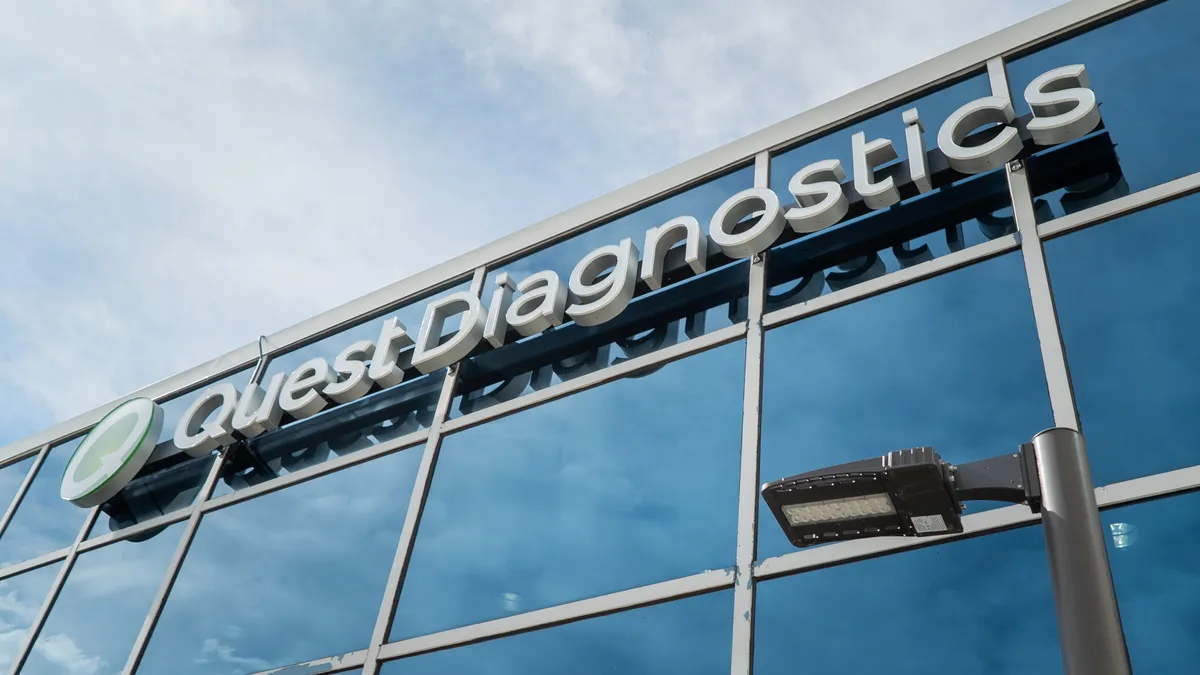Quest Diagnostics this week reported for the first time since May an average turnaround time for COVID-19 molecular diagnostic tests between one and two days.
It's a turnabout from most of July, when the lab giant's test results took seven days or longer. Chief rival LabCorp meanwhile reported four- to six-day wait times at the start of July, and trimmed it to two to three days by the end of the month. As of last week, LabCorp's average time to deliver results was between one and three days.
Why the stark contrast for much of July? Geography, timing and the makeup of Quest's customer base may have slowed down the Secaucus, New Jersey-headquartered lab network.
As the nation’s two largest commercial laboratories, LabCorp and Quest have scaled up molecular diagnostic testing to meet the unrelenting U.S. demand for COVID-19 tests. However, LabCorp was able to increase capacity for molecular tests from 130,000 at the end of June to 165,000 tests per day by mid-July to 180,000 tests a day by the end of the month. By comparison, Quest at the beginning of July had daily testing capacity of 120,000 tests and ended the month performing just 135,000 molecular diagnostic tests a day.
Currently, LabCorp is able to process 180,000 molecular diagnostic tests per day to Quest's daily capacity of 150,000. A closer look shows why Quest has repeatedly lagged behind LabCorp.
"We have a large presence in the four largest states" by population, a Quest spokesperson said, referring to California, Texas, Florida and New York. In the first three states on that list, which are the most populous in the U.S., coronavirus cases began to rise in June and by mid-July emerged as COVID-19 hotspots that collectively accounted for almost 20% of the world’s new cases, according to an analysis by NBC News.
“Quest is very big in Florida and LabCorp’s presence in the state is not as deep or as broad," said Brian Tanquilut, a healthcare services equity analyst at Jefferies. "Obviously, Florida is a hotspot," Tanquilut added. "There is a geographic component to the fact that Quest is getting a lot of demand in the market where they are heavily exposed."
At the same time, the northeast and parts of the mid-Atlantic states are strong LabCorp markets, Tanquilut noted.
"The thing about those markets, all the way up to New York, is that those cities have already gone through the big COVID waves. It’s more of Quest’s markets that saw the COVID uptick whereas LabCorp’s markets stabilized," Tanquilut said.
LabCorp did not provide details on its market size by state.
Quest acknowledged that rising demand in July for molecular diagnostics outpaced its ability to quickly process the tests, leading to backlogs and delays. It wasn't until Aug. 3 that Quest reported growing capacity coupled with plateauing demand had started to translate into faster turnaround times of five days versus seven days the prior week. In its public statements, Quest would often point out that “turnaround time can fluctuate with demand and vary by region.”
A compounding effect
In addition to geography, Quest appears to have been hamstrung by its hefty number of hospital customers. "Quest serves half the hospitals, one-third of the adult U.S. population," a company spokesperson noted.
Tanquilut noted that Quest runs more hospital labs than LabCorp, forcing the company to give top priority for testing to specimens collected from hospitalized patients, as well as pre-operative patients in acute care settings and symptomatic healthcare workers.
With more of these Priority 1 patients and an already strained molecular testing capacity, Quest has fewer resources to devote to non-priority patients, Tanquilut said. “The fact that Quest has more hospital relationships [than LabCorp] means they’re capturing more volume for those hospitals.”
Donald Hooker, equity research analyst at KeyBanc Capital Markets, also pointed to Quest's deal in 2019 to become a national provider of laboratory services for all UnitedHealthcare plan participants as potentially straining capacity.
"That’s not new. But when you combine a spike in COVID cases in certain regions [with UnitedHealthcare] and the preferred lab network relationship that they have ... you have a compounding effect,” Hooker said.
Another potential source of Quest's struggles to keep up with the unprecedented testing demand during July, particularly in the South, Southwest and West regions of the country, was its constrained supply chain. Throughout July, Quest stressed that access to test platforms and reagents was limited amid surging demand.
Quest on July 20 reported "the most significant gating factor we currently face is limits to the testing platforms, the complex machines that perform the technical analysis, as well as reagents, or chemicals, required to perform testing." And, again on July 27, Quest warned the "most significant hurdle we face now is limits to complex testing platforms and chemical reagents required to perform testing."
But Tanquilut doesn’t see an advantage for either LabCorp or Quest when it comes to managing their supply chains for critical testing materials such as reagents. “The reagents for both are coming from a lot of the same manufacturers so I don’t think that’s the bottleneck."
Nonetheless, Quest claimed it increased capacity through several "lab innovations" including the use of specimen pooling, a method meant to screen more people using fewer testing resources. On July 18, Quest announced its PCR test was granted an emergency use authorization for sample pooling. Just a week later LabCorp announced that it also received an EUA from the agency authorizing diagnostic testing of groups of individuals for active COVID-19 infections using pooled testing.
When it comes to sample pooling, LabCorp has a slight quantitative edge on Quest. LabCorp's pooled testing method involves testing up to five samples at once while Quest's molecular test allows specimens collected from four individuals to be tested in a pool or “batch” using one test.
While Quest seems to have rebounded this month from a tough July for COVID-19 testing, the company has not emerged from the ordeal unscathed. Quest's credibility was called into question by an Aug. 7 CNN report. At the time, the company's publicly announced turnaround for test results was on average five days. However, the media outlet said it obtained internal Quest records indicating it was actually more than eight days.
A Quest spokesperson told CNN that the "publicly reported number represented a forward-looking, 'expected' figure for how long patient samples received that day would take to turnaround" and that "the number did not reflect the actual time it took the company to get results on samples it had already tested."

















